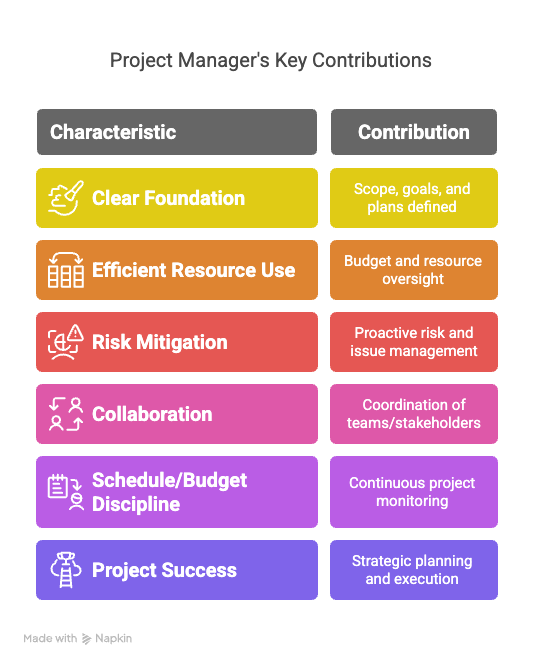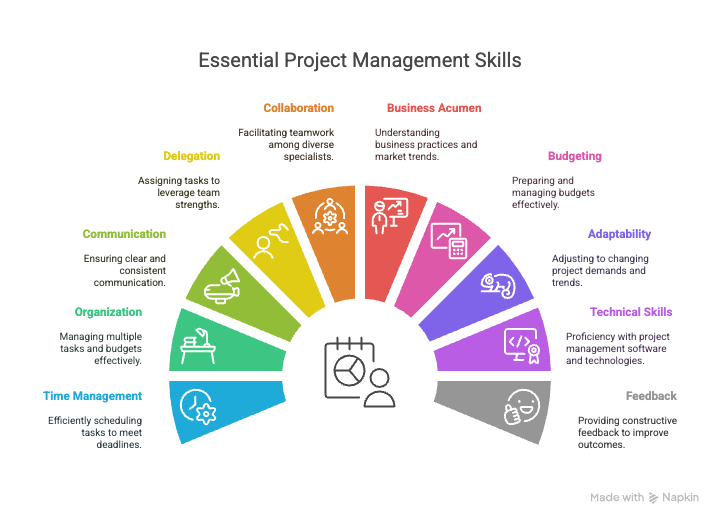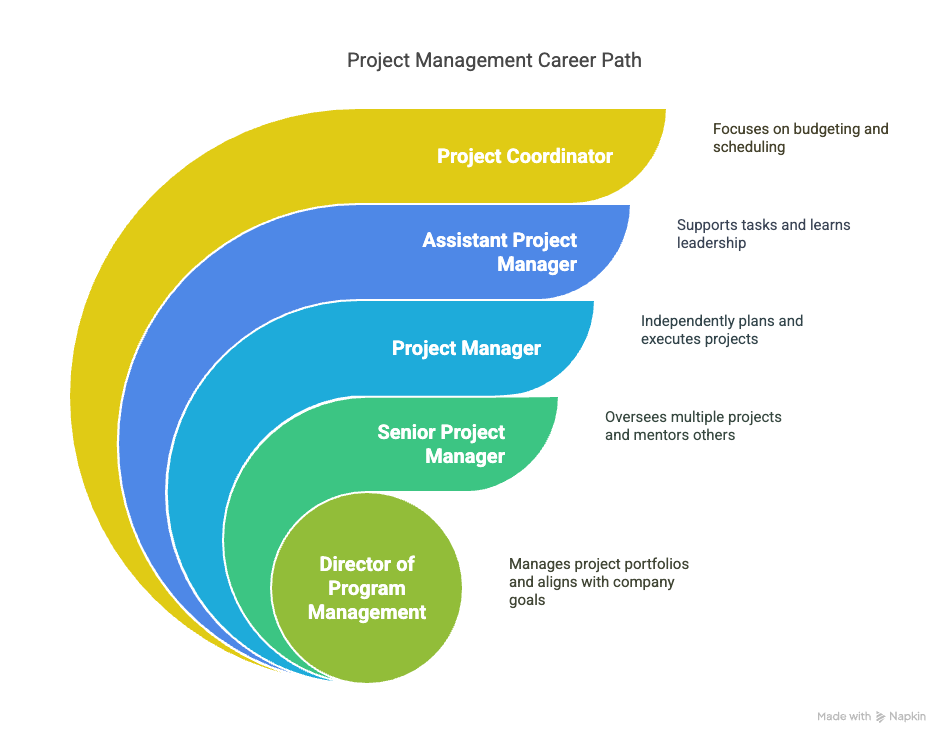Choosing the right project manager can make or break your new project. Whether you’re launching a tech startup, overseeing a construction venture, or rolling out a marketing campaign, the question remains: who do you hire as a project manager for the new project? A skilled project manager ensures timelines are met, budgets are respected, and teams stay aligned.
Interested in finding the best project manager? With Go Carpathian, you can outsource highly skilled professionals from Eastern Europe, South Africa, and Latin America. Outsourcing in these regions allows you to reduce operational costs while leveraging the expertise of the local pre-vetted talent. Contact us today to schedule a meeting with our recruiting specialist.
In this article, we’ll explore the essential qualities, qualifications, and steps to find the perfect candidate, helping you make a confident hiring decision that drives success.
Understanding the Role of a Project Manager
A project manager, particularly in digital marketing or similar fields, holds key responsibilities critical to the success of new projects. Project managers are indispensable in steering new projects through complexity and uncertainty, ensuring that they are delivered efficiently, effectively, and aligned with business goals.
Here are the main responsibilities of Project Managers:
Project Planning and Scope Definition
Define the project scope, goals, and deliverables clearly, establishing detailed work plans and timelines to guide the project from start to finish.
Resource Management
Identify and allocate necessary resources, including team members, budgets, and tools, ensuring optimal use for successful project delivery.
Task Assignment and Team Coordination
Assign tasks to appropriate team members, facilitate collaboration across cross-functional teams, and enhance communication among stakeholders.
Monitoring and Controlling
Track project progress against timelines and budgets, manage risks, troubleshoot issues, and make adjustments to keep the project on track.
Stakeholder Communication
Serve as the primary point of contact between internal teams, clients, and external collaborators, ensuring transparency and alignment throughout the project lifecycle.
Quality Assurance and Delivery
Oversee the execution of project tasks to meet quality standards and ensure projects are completed on time and within budget.
Change Management
Implement change management processes to adapt to evolving project requirements or external factors.
Performance Reporting
Monitor and report key performance indicators to evaluate project effectiveness and inform future strategies.
Hiring a project manager for a new project is crucial for your business because they:
- Establish a Clear Foundation: By defining scope, goals, and plans early, they set a strong foundation that guides the project and reduces ambiguity.
- Ensure Efficient Resource Use: Their oversight of budgets and resources prevents waste and maximizes the chance of project success.
- Mitigate Risks: Proactively managing risks and troubleshooting issues minimizes delays and cost overruns.
- Facilitate Collaboration: They coordinate diverse teams and stakeholders, ensuring that everyone is aligned and working towards common objectives.
- Maintain Schedule and Budget Discipline: Their continuous monitoring keeps projects on schedule and within financial limits, critical for meeting organizational expectations.
- Drive Project Success: By balancing strategic planning, execution, and communication, project managers help deliver projects that meet or exceed objectives, which is especially vital for new initiatives where uncertainty is higher.
Key Qualities to Look for in a Project Manager
The best project managers combine strong organizational, communication, and leadership skills with deep industry knowledge and technical proficiency. Their adaptability, business insight, and mastery of project management and digital marketing tools enable them to deliver successful projects aligned with strategic goals and evolving market demands.
Here are the main skills that top project managers must have:
- Time Management: Ability to meet deadlines by efficiently scheduling tasks and adjusting operations to maintain productivity.
- Organization: Managing multiple concurrent tasks, schedules, and budgets effectively to keep projects on track.
- Communication: Clear, consistent communication with team members, clients, and stakeholders to ensure alignment and smooth workflow.
- Delegation: Knowing how to assign tasks appropriately to leverage team strengths and maintain oversight without micromanaging.
- Collaboration: Facilitating teamwork among diverse specialists (e.g., designers, copywriters) to achieve common goals.
- Business Acumen: Understanding business practices, market trends, and consumer behavior to make informed decisions and negotiate effectively.
- Budgeting: Preparing and managing budgets, adjusting for unforeseen expenses, and ensuring financial discipline.
- Adaptability and Continuous Learning: Adjusting to changing project demands, industry trends, and technologies; staying resilient and flexible.
- Technical Skills: Proficiency with project management software, agile methodologies (Scrum, Kanban), web technologies (HTML, CSS, JavaScript), UX principles, and cloud platforms.
- Ability to Give Feedback: Providing constructive, professional feedback to guide team members and improve project outcomes.
Industry Knowledge
Besides skills, top project managers must have industry knowledge as well. That includes Digital Marketing Expertise, which includes understanding SEO, content marketing, e-commerce models, advertising, and digital campaign workflows to align project goals with marketing strategies. Industry knowledge also includes being up-to-date with Industry Trends and data analysis and decision making (using data-driven insights to assess project impact and make strategic adjustments).
Tools Proficiency
Besides knowledge, the best project managers know how to use project management tools to optimize their work:
- Project Management Software: Mastery of tools like Asana, Trello, Wrike, or Microsoft Project for task assignment, scheduling, resource planning, and progress tracking.
- Workflow and Task Management Systems: Utilizing software to streamline workflows, manage deliverables, and ensure timely execution.
- Digital Marketing Tools: Familiarity with Google Analytics, CRM platforms, SEO tools (e.g., Semrush), and content management systems to integrate marketing and project management efforts.
- Agile Frameworks: Applying Scrum, Kanban, Lean, or Extreme Programming to manage iterative project phases and continuous improvement.
Qualifications and Experience for a Project Manager
To qualify as a project manager, especially in digital marketing, candidates generally need a relevant bachelor’s degree, 3-5 years of project management experience with a focus on digital or technical projects, and proficiency in project management methodologies and digital tools. Strong communication, leadership, and problem-solving skills complement technical knowledge and industry expertise to ensure successful project delivery.
Here’s everything you need to know about the main qualifications and experience for project managers:
Educational Qualifications
Educational qualifications for project managers typically include a bachelor’s degree in fields such as business, marketing, information technology, or related disciplines, often complemented by professional certifications to enhance expertise and credibility.
Bachelor’s Degree
Most digital project manager roles require at least a bachelor’s degree in relevant fields such as business administration, marketing, communications, information technology, or digital marketing.
Advanced Degrees (Optional)
Some positions prefer or require a master’s degree in project management, digital strategy, or related disciplines, which provide deeper theoretical and practical knowledge.
Certifications (Beneficial)
Certifications like PMP (Project Management Professional), Agile, Scrum Master, or specialized digital marketing/project management certificates enhance credibility and skills but are not always mandatory.
Professional Experience
Professional experience for project managers generally involves several years of progressively responsible roles in managing projects, demonstrating skills in leadership, coordination, and successful project delivery within relevant industries.
Relevant Work Experience
Typically, 3 to 5+ years of experience managing projects, especially in digital marketing or IT environments, is expected. Experience should demonstrate the ability to lead projects from initiation through execution and delivery.
Industry-Specific Experience
Familiarity with digital marketing campaigns, SEO, social media, content management systems, and advertising platforms is highly valued. Experience with managing technical and marketing projects is critical for understanding the nuances of digital project management.
Progressive Responsibility
Candidates often start in roles such as marketing coordinator, project coordinator, or junior project manager and progressively take on more complex projects and leadership duties.
Types of Project Managers for Different Projects
Project managers differ by their leadership style, industry specialization, level of responsibility, and preferred project management methodology, each suited to different project types and organizational needs.
Here are key types of project managers for different projects:
1. Types Based on Leadership Style (Harvard Business Review)
- Executor: Focuses on executing projects aligned with existing business strategies, ensuring reliable delivery with minimal risk.
- Prophet: Has a visionary approach, pursuing long-term growth opportunities often outside current business boundaries, suitable for innovative or “moonshot” projects.
- Expert: Relies on deep technical or functional expertise to guide projects, often excelling in specialized or complex domains.
- Gambler: Willing to take risks and explore uncertain or high-stakes projects, often driving innovation but with higher uncertainty.
2. Types Based on Industry or Project Domain
- IT Project Manager: Manages software development or infrastructure projects, often skilled in Agile, Scrum, and technical knowledge like SDLC.
- Construction Manager: Oversees construction projects, managing design, bidding, and on-site execution, often requiring certifications like CCM.
- Architectural Project Manager: Coordinates design teams and construction communication, focusing on budget, schedule, and quality control in architectural projects.
- Marketing Project Manager: Handles marketing campaigns, product launches, and research projects, requiring knowledge of digital marketing and advertising workflows.
3. Types Based on Role Level and Responsibilities
- Project Coordinator: Junior role focusing on budgeting, scheduling, and reporting under a project manager’s supervision.
- Assistant Project Manager: Supports the project manager, often handling delegated tasks and learning leadership skills.
- Project Manager: Mid-level role responsible for planning, executing, and closing projects independently.
- Senior Project Manager: Oversees multiple projects or teams, often mentoring other project managers.
- Director of Program Management: Manages the overall portfolio of projects, aligning them with strategic company goals.
4. Types Based on Project Management Methodology
- Waterfall Project Manager: Manages projects with a sequential, linear approach where each phase completes before the next begins, common in construction or manufacturing.
- Agile Project Manager: Uses iterative, flexible methods suited for software development and projects requiring frequent adaptation.
- Lean Project Manager: Focuses on minimizing waste and maximizing value, applicable across industries, emphasizing efficiency.
Common Mistakes to Avoid When Hiring Project Managers
When hiring project managers, avoiding these common pitfalls can significantly improve the chances of selecting the right candidate:
- Ignoring Industry-Specific Experience: Hiring a project manager without relevant experience in your industry can lead to costly oversights and inefficiencies, as they may not understand unique challenges or ask the right questions.
- Overlooking Communication Skills: Poor communication from a project manager can cause confusion, delays, and misaligned expectations. Look for candidates who can clearly translate technical jargon and keep all stakeholders informed.
- Skipping Behavioral and Scenario-Based Questions: Failing to assess how candidates handle real-world challenges through hypotheticals or situational questions may result in hiring someone who struggles under pressure or cannot problem-solve effectively.
- Rushing the Hiring Process: Filling a vacancy too quickly without thorough screening can lead to mismatches in skills or culture fit, increasing the risk of project failure.
- Overemphasizing Technical Skills Over Soft Skills: While technical expertise is important, neglecting leadership, team management, and conflict resolution abilities can undermine project success.
- Not Assessing Methodology Flexibility: Project managers often have preferred methodologies (Agile, Waterfall, etc.). Hiring without understanding their approach or adaptability can cause friction if it doesn’t align with your organization’s practices.
- Failing to Evaluate Holistic and Strategic Thinking: Especially for complex projects, a project manager should consider organizational impacts beyond immediate tasks. Ignoring this can lead to siloed decisions and missed opportunities for synergy.
- People-Pleasing Tendencies: Candidates who avoid difficult conversations to maintain harmony may allow scope creep or unresolved issues, putting projects at risk.
- Neglecting KPI and Performance Tracking Experience: Without a focus on key performance indicators, it is hard to measure project success or identify issues early.
- Insufficient Focus on Leadership and Delegation: Project managers who try to control every detail without delegating can overwhelm themselves and demotivate team members, reducing overall productivity.
Steps to Hire the Right Project Manager
Hiring the right project manager for your new project requires a structured approach to ensure you find a candidate with the skills, experience, and cultural fit to drive success. By following these steps, you can confidently answer the question: who do you hire as a project manager for the new project?
Define the Role and Requirements
Start by crafting a detailed job description that outlines the project’s scope, objectives, and deliverables. Specify required skills (e.g., proficiency in tools like Jira or MS Project), certifications (e.g., PMP, Agile), and industry experience. A clear job description helps attract candidates who align with your needs and sets expectations for who to hire as a project manager for the new project.
Source Candidates from Targeted Platforms
Post the job on platforms frequented by project managers, such as LinkedIn, Indeed, or specialized sites like PMI.org. Leverage professional networks or industry-specific forums to find talent with relevant expertise. Consider working with recruiters for senior roles to narrow down the pool of qualified candidates.
Screen Resumes for Relevant Experience
Review resumes to identify candidates with a proven track record in managing similar projects. Look for measurable achievements, such as delivering projects on time or under budget. Prioritize those with certifications and experience that match your project’s demands, ensuring you shortlist the best fits for whom to hire as a project manager for the new project.
Conduct Structured Interviews
Use behavioral and scenario-based questions to assess candidates’ problem-solving, leadership, and communication skills. For example, ask, “How would you handle a project delay caused by a key team member?” or “Describe a time you managed stakeholder conflicts.” These questions reveal how candidates approach real-world challenges, helping you evaluate their suitability.
Check References and Portfolios
Verify candidates’ past performance by contacting references to confirm their ability to manage projects effectively. Request portfolios or case studies showcasing successful projects, especially those similar to yours. This step ensures you’re choosing a project manager with a history of delivering results.
Assess Cultural Fit and Team Dynamics
A project manager must work seamlessly with your team. During interviews, gauge their interpersonal skills and alignment with your company’s values. Consider involving team members in the hiring process to assess compatibility, as a good cultural fit is critical for whom to hire as a project manager for the new project.
Make a Data-Driven Hiring Decision
Compare candidates based on their skills, experience, interview performance, and references. Use a scoring system or decision matrix to objectively evaluate each applicant. Select the candidate who best meets the project’s needs and demonstrates the ability to lead it to success.
Are You Ready to Hire an Amazing Project Manager?
Hiring the right project manager is crucial because they take full ownership of a project from start to finish, ensuring that objectives are met on time, within budget, and to quality standards while allowing other team members to focus on their core tasks. A skilled project manager streamlines workflows, manages resources efficiently, mitigates risks, controls scope creep, and serves as the central point of contact for all stakeholders, which enhances communication, team morale, and overall project transparency. Their strategic oversight and coordination prevent delays and disorganization, making them indispensable for managing complex or high-volume projects and ultimately driving successful project delivery that aligns with business goals.
Have you considered a top global project manager? International recruiting can significantly impact business profitability and quality by allowing companies to leverage skills and economies of scale, thereby reducing operational costs and enhancing profitability. It also enables businesses to focus on core operations, driving strategic growth and innovation.
Go Carpathian is the most reliable partner for international recruitment. Schedule a Discovery Call to learn more about finding the best international hires in Eastern Europe, Latin America, and South Africa









